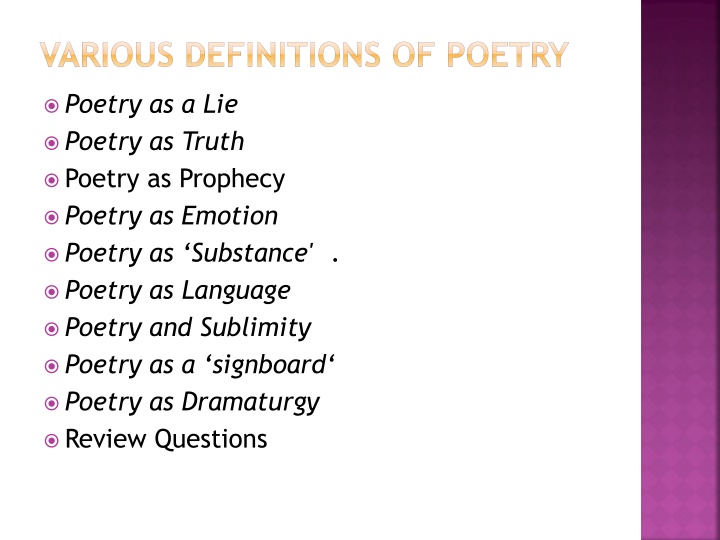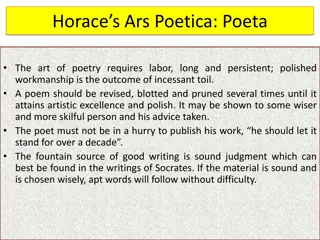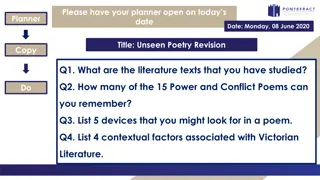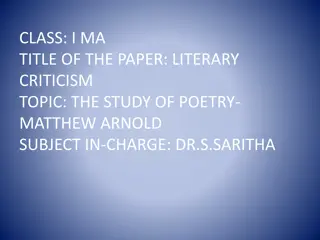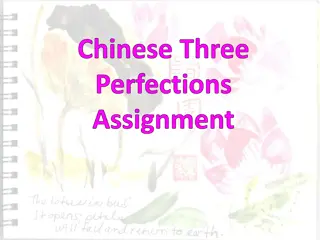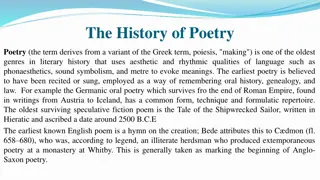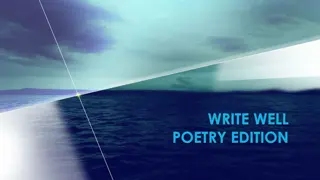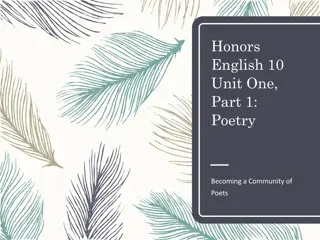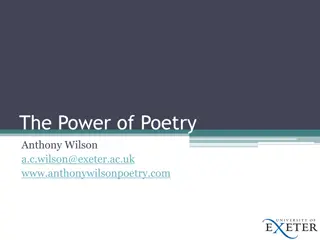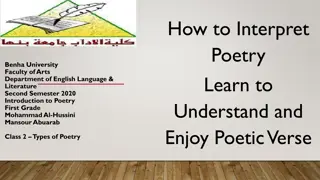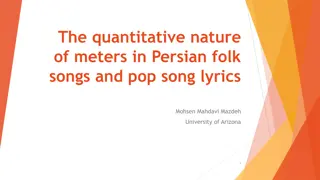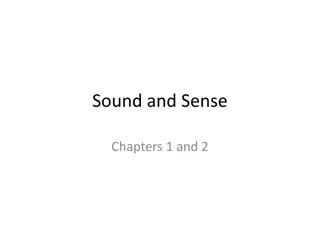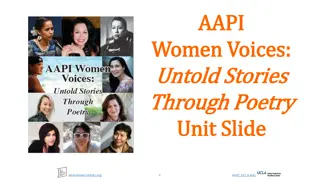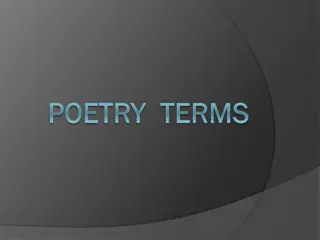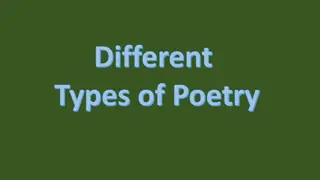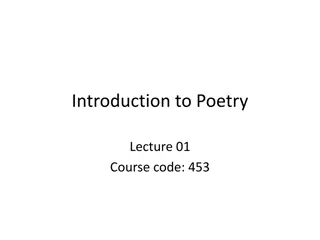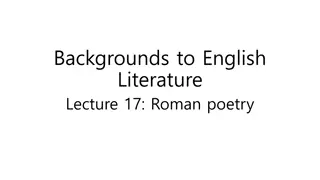Exploring Various Definitions of Poetry
Delve into the multifaceted nature of poetry through different perspectives such as poetry as a lie according to Plato, poetry as truth per Aristotle, poetry as prophecy as observed by T.S. Eliot, poetry as an expression of emotion according to Wordsworth and Mills, and poetry as substance as articulated by Burke.
Download Presentation

Please find below an Image/Link to download the presentation.
The content on the website is provided AS IS for your information and personal use only. It may not be sold, licensed, or shared on other websites without obtaining consent from the author.If you encounter any issues during the download, it is possible that the publisher has removed the file from their server.
You are allowed to download the files provided on this website for personal or commercial use, subject to the condition that they are used lawfully. All files are the property of their respective owners.
The content on the website is provided AS IS for your information and personal use only. It may not be sold, licensed, or shared on other websites without obtaining consent from the author.
E N D
Presentation Transcript
VARIOUS DEFINITIONS OF POETRY Poetry as a Lie Poetry as Truth Poetry as Prophecy Poetry as Emotion Poetry as Substance' . Poetry as Language Poetry and Sublimity Poetry as a signboard Poetry as Dramaturgy Review Questions
POETRY AS A LIE According to Plato: life is an imitation of the true 'reality' that lies within man. The poets imitate life in their poetry, thus their work is 'twice removed from reality,' as such they are liars.
POETRY AS TRUTH Aristotle on the other hand sees poetry as 'notation of an action' and a 'truth higher than history.' According to him, while history deals with particular facts, poetry deals with the universal and is capable of a higher philosophical value than history.
POETRY AS PROPHECY T. S Eliot furthering this argument observes that a large part of any poet's inspiration must come from his reading and knowledge of history, and his acquaintance with his past yet the fact remains Unlike the historian, (poetry) uses not only actual happenings as motif but also creates situations and influences by his work the course of events. In the process, he is sometimes prophetic.
POETRY AS EMOTION The Romantic poet, William Wordsworth, observed that poetry is that spontaneous overflow of powerful feelings which takes its origin from emotion recollected in tranquility.
POETRY AS EMOTION CONTD. John Stuart Mills extends this definition to note that poetry is the delineation of the deeper and more secret working of human emotion. 'It is feeling confessing itself to itself in moments of solitude and embodying itself in symbols which are nearest possible representative actions of the feeling in the exact shape in which it exists in the poet's mind.'
POETRY AS SUBSTANCE' . Edmund Burke says that 'poetry is the art of substantiating shadows, and lending existence to nothing. This idea stems from the ability of the poet to lend expression and make real 'nebulous' feelings that have been lurking in the fringes of the mind.
POETRY AS LANGUAGE According to Romanus Egudu 'poetry is a method of expression by suggestion through invented or created imagery, beat or rhythm and sound.' Alexander Pope sees poetry as 'what oft was thought, but never so well exprest' (which means that no language can capture exactly that which is in the poet s mind). A. E Housman insists that 'poetry is not the thing said but a way of saying it.'
POETRY AND SUBLIMITY According to Bailey, 'poetry is itself a thing of God... and the more we think of poetry, the more we do become like God, in love and power. Senanu and Vincent also note that the poet seeks to communicate his vision. Its full impact is realised in our experience of the poem as a whole through our understanding of the techniques that the poet uses to create this sense of identification and universalisation.3
POETRY AS A SIGNBOARD' W. H Auden, perceives poetry as something immortal: For poetry makes nothing happen... it survives In the valley of its saying where executives Would never want to tamper; it flows south From ranches of isolation and the busy griefs Raw towns that we believe and die in; it survives, A way of happening, a mouth ('In Memory of W.B Yeats )
POETRY AS DRAMATURGY Simply put poetry makes a comment upon the world and involves 'truths' that the poet has discovered about all human nature. Although poetry often makes use of abstract concepts, poems are incorrigibly concrete. By this we mean that poetry is concerned with man and life. As Ebenezer Eliot puts it, poetry is 'impassioned truth, man's thoughts tinged by his feelings.' Oscar Wilde observes in 'the Truth of Masks': 'Man is least himself when he talks in his own person. Give him a mask and he will tell you the truth.'
REVIEW QUESTIONS What in your own view is the reason for the various definitions of poetry? How does Plato's reception of poets differ from that of other literary scholars? Compare and contrast Wordsworth's definition of poetry with that of Burke. Use poems to illustrate your answers.
